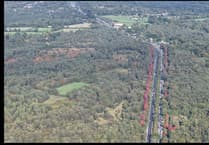On a pleasant autumn evening in Liphook, it was hard to imagine war intruding on the well-heeled Hampshire village.
Before the start of the event at the Millennium Centre last week, the atmosphere was sociable as friendly Liberal Democrats mingled with glasses of wine in hand.
Yet the speaker, retired Brigadier Gerhard Wheeler, was there to offer some stark truths about the risks confronting our nation in these uncertain times.
“We are currently facing a wider spectrum of threats than we have for a long time,” he told local Lib Dem campaigner Theresa Meredith-Hardy during their discussion.
Mr Wheeler, who lives in the Farnham area, set out dangers ranging from cyberattacks and sabotage to the fragility of NATO itself.
He spoke from long experience. With more than 30 years in the Army, he commanded a regiment in Iraq and, at the end of Britain’s campaign in Afghanistan, led all UK troops there.

After leaving the Army, he went on to advise on defence strategy, working with the Foreign Office and the Ministry of Defence. By his own modest accounts, it was “a pretty good grounding on defence issues.”
Asked what people should be most concerned about, Mr Wheeler outlined a wide spectrum.
He mentioned the continuing threat of terrorism, citing groups linked to Northern Ireland, radical Islamist movements, animal rights extremists and elements of the far right.
But, he continued, that is only part of the picture.
More recently this has been overlaid with state threats, also known as grey zone or hybrid activity.
These are hostile acts done by malign states who want to disrupt our way of life, but do it as just a level below when we might react with going to war.
Today’s dangers include Russian drones straying across borders, ships without licences dragging anchors across transatlantic cables, and cyberattacks on critical infrastructure.
Mr Wheeler pointed to the Salisbury poisoning as an example of “low-level assassination” designed to destabilise without triggering a wider conflict.
“On top of that, the biggest threat to us now is an attempt to break up the integrity of NATO,” he cautioned.
“I can’t see a bigger threat than that Russia might try to do something that was a hostile act, which would breach Article 5 of the NATO treaty, where allies are expected to react,” he said.
As an example, he highlighted the Suwałki Gap, a 50-mile strip between Belarus and the Russian enclave of Kaliningrad. A Russian move there could test the alliance.
It would be, he argued, an act of hostility “daring us if we’re willing to do anything about it, and if we don’t then it’s a question mark on the whole alliance, and we would become single countries rather than an alliance.”
Mr Wheeler noted that he could not give a defence talk without mentioning Carl von Clausewitz, the Prussian general he called “the godfather” of military theory and philosophy. Clausewitz defined war’s nature as unchanging: violent, unpredictable and “politics by other means.”
“I agree with that, the nature of war doesn’t change — anyone who looks back to [the] Napoleonic period will see that it has,” Mr Wheeler observed.
But while the nature of war is constant, its character is not. From muskets to stealth fighters, the methods of battle have always evolved. Ukraine, Mr Wheeler said, has revealed the latest shift: AI, drones and long-range missiles, combined with cyber and space technology, are already shaping how future wars will be fought.
The brigadier traced the long history of British defence spending. In World War II, the UK spent 50 percent of GDP on the war effort before falling to about 10 percent the 1950s, with empire our commitments. In the 1970s and 1980s it steadied at 5 percent. After the Berlin Wall fell, it dropped again, reaching 2 percent by 2015.
Now, ministers are pushing toward 2.7 percent, with a longer-term ambition of 3 percent. The Strategic Defence Review 2025 lays out plans for new nuclear attack submarines, new state-of-the-art strike fighters, and a digital targeting network that allows any sensor to connect to a weapon across the battlefield.
“It’s a pretty good review,” Mr Wheeler said. But he warned that ambition alone is not enough. “The risk is how are we going to pay for it all?
“I think it’s an ambitious plan, focused on the right ideas, but whether or not we as a country can afford it is another question.”
On the question of dependence on the United States, Mr Wheeler’s answer was cautious but clear: yes, but “in a nuanced way.”
He said that while Donald Trump’s heavy-handed approach to diplomacy had upended the world order, even without the US president “there is clearly a geopolitical need for less reliance on America.”
“There is no reason why Europe with minimal help cannot look after itself,” Mr Wheeler maintained.
Britain, he emphasised, remains vital. “We are one of the two nuclear powers in Europe — after France and ourselves. We offer deterrent capability to the whole of Europe.”
He pointed to the Joint Expeditionary Force, which relies on British leadership outside NATO’s guaranteed response, and to deployments in Estonia and naval responsibilities in the North Atlantic. “It would be easier if we were still in the European Union,” he added.
Turning to Ukraine, Mr Wheeler urged against seeing the war purely in terms of shifting frontlines. “Trying to follow one side [gaining] a couple of extra kilometres one way or the other is a bit like watching the First World War,” he explained.
“It’s an attritional campaign, one country trying to break the economy and will of another. They will, in Russia’s case, continue bashing away until hopes Ukraine will break, and it depends on Ukraine’s will to fight, and other country’s support.”
He compared it to the Iran-Iraq war of the 1980s, which dragged on for a decade with millions of casualties before both sides gave up from exhaustion. That, he said, is one scenario. Another is a frozen conflict like the Korean peninsula. “There are no good options at the moment,” he concluded.
Mr Wheeler’s prescription for Britain’s armed forces was practical. First, he argued we should ensure what we have is fully operational.
Ships shouldn’t be in dry docks for 10 months or even years, and we should rebuild our munition stocks which have been reduced for last 10–20 years.
Secondly, he called for investment in new technologies: missile systems, drones, sensors. Thirdly, he urged rebuilding personnel by improving recruitment and retention, particularly in the reserves.
He also pointed to Sweden’s example of distributing booklets to households explaining what to do in a crisis, from war to floods. Preparing the population, he said, is as important as preparing the military.
But essentially, we must all maintain war readiness.
Despite his sober assessment, Mr Wheeler ended with a note of guarded optimism. He suggested that Trump’s erratic behaviour had forced European countries to take defence more seriously.
He predicted that China would not invade Taiwan as it was “too risky, too difficult”, although he added with a smile that he had said “the same about Russia invading Ukraine.”
The remark drew laughter, but also recognition of the unpredictable world he had described.



Comments
This article has no comments yet. Be the first to leave a comment.